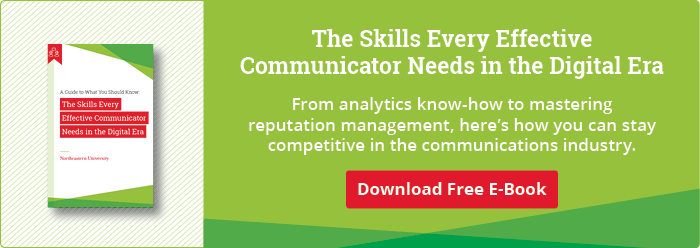Editor’s note: This post originally appeared on the Communications Alumni Network Blog.
For K. Dawn Rutledge, a 2012 alumna of the MS in Corporate and Organizational Communication program, storytelling has been a constant thread throughout her life and career as a  communicator. Dawn vividly remembers entering a poetry-writing contest in eighth grade. “I actually won first place in that contest, and so my love of writing started very early. I was also fascinated with how people like Oprah Winfrey could move their audiences with compelling stories.”
communicator. Dawn vividly remembers entering a poetry-writing contest in eighth grade. “I actually won first place in that contest, and so my love of writing started very early. I was also fascinated with how people like Oprah Winfrey could move their audiences with compelling stories.”
That love of storytelling has led to a long professional career in communication in a wide range of sectors: First a stint in journalism, then work in the nonprofit, corporate, governmental, entertainment, and educational sectors. Now, as a consultant and educator, Dawn enjoys helping others tell their stories.
In a recent interview, Dawn describes three stops along her journey and shares some excellent advice for communicators at the beginning of their careers.
Repairing a Corporate Reputation
One of my first jobs was as a public relations specialist for Cracker Barrel Old Country Store, Inc., an American chain of combined restaurant and gift stores with a Southern country theme.
Cracker Barrel had just settled several lawsuits involving racial discrimination. The settlement found that Black customers at many of the company’s restaurants were seated in areas segregated from white patrons and often received inferior service.
My main job was to come in and to help to rebuild relationships. We wanted our minority customers to feel welcome in our restaurants. To do that, we conducted an outreach campaign. We ran advertorials in African-American and Hispanic newspapers, participated in conferences and festivals; we even hosted diverse events at local stores, including even having Miss Black Tennessee come to a store, engage with customers, and sign autographs. We also conducted pulse surveys on a regular basis to understand how we could improve the dining and shopping experience for minority customers.
 A person’s experience with a brand is influenced in so many ways. When you walk into a store, for instance, do you see photos of people who look like you? Do you see decorative items that represent your community, especially for a brand that is trying to convey a rustic, historical feeling? We spent a lot of time thinking about how to make each store a more welcoming place for customers of all races.
A person’s experience with a brand is influenced in so many ways. When you walk into a store, for instance, do you see photos of people who look like you? Do you see decorative items that represent your community, especially for a brand that is trying to convey a rustic, historical feeling? We spent a lot of time thinking about how to make each store a more welcoming place for customers of all races.
Developing Business Across Cultures
Tennessee’s former governor Phil Bredesen wanted to create jobs by attracting major corporations to do business in the state. I was hired to come work for the Department of Economic and Community Development. I was the first Black person to be hired to run the department’s communication function. The role involved promoting business development across the state.
The effort I remember the most involved persuading Nissan, the Japanese automaker, to relocate its corporate headquarters to Tennessee. What a case study in cross-cultural communication! We worked hard to get our messages right as we interacted with Nissan’s executive team. Bridging the very different communication dynamics was a challenge, but it was also a great learning experience for me. The state ultimately persuaded Nissan to move to Tennessee and build an assembly plant—which now employs 8,400 people and has an annual production capacity of 640,000 vehicles.
Executing a Rebranding Strategy
I spent 10 years as a communication leader at Tennessee State University, a historically Black university in Nashville, and part of my job was to execute a rebranding strategy to boost enrollment and retention. As with any true rebranding effort, we had to change the culture. The university’s departments operated in silos with very little shared sense of identity.

We were fortunate to have the support of the university’s president. This was essential. We were able to communicate the direction we were going into the entire academic community and why. But we also tried to promote buy-in for the changes. We didn’t want to leave departments high and dry, just saying ‘this is the way it’s going to be.’ We made it easy for them to incorporate the new branding guidelines into their everyday work.
The other thing I’m very proud of was helping organize the university’s centennial celebration. We held numerous events for students, faculty, alumni, and corporate partners—and of course, it was a great fundraising opportunity. We were able to bring back all the university’s past presidents for a panel discussion which was a very special event!
Reflecting on my Career Journey
I think that you shouldn’t limit yourself. I consider myself to be a lifelong learner. Because I was able to have experiences in a range of different fields, it’s given me a very broad picture of how things work. Every sector, every organization has its own distinctive communication dynamics. So, don’t feel like you have to stay in one sector throughout your career.
Another piece of advice to students: Seize opportunities, and go where your interests take you. Don’t be afraid to work for free. I did more than one unpaid internship at the beginning of my career —I was like a sponge, asking questions, observing the workplace dynamics. Be curious! Don’t be afraid to ask questions, don’t be afraid of hard work, because that’s what’s going to get you to the next level. It’s also why Northeastern’s experiential learning opportunities are so valuable.
The ability to tell stories is a skill that is critical in any communication role regardless of what sector you’re working in. And the stories are everywhere; look for them! It’s the path I’ve taken, and I still love telling powerful stories.
From Our Reading List:
- McKinsey on rebuilding corporate reputations
- Vanessa Boris on what makes storytelling so effective
- The neuroscience of storytelling on NPR
Learn more about the communication skills required to succeed in today’s business world by downloading our free guide below.







Related Articles
Faculty Insights: What Do Employers Look for in a New Candidate?
Virtual Co-op Evolves Into a Social Platform WomenVotes.org
Why You Should Consider a Career in Technical Writing